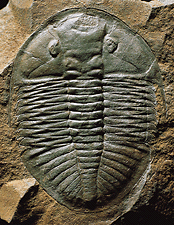Canadian Fossil Site Thrills Scientists
Thursday, February 13th, 2014February 13, 2014
The discovery of a site in Canada containing hundreds of ancient fossils is being heralded as one of the most important discoveries in paleontology in the past 100 years. The huge fossil site, located in Marble Canyon in Kootenay National Park in southeastern British Columbia, contains hundreds of magnificently preserved fossils of early animals from the Cambrian, a period in Earth’s history that lasted from about 543 million to 490 million years ago. So far, scientists have found the fossils of more than 50 invertebrate (animals without backbones) species, about a dozen of which have never been seen before. The site rivals the famous Burgess Shale formation, a 505 million-year-old site discovered in 1909 in Yoho National Park about 26 miles (42 kilometers) northwest of Marble Canyon. For now, the exact location of the fossil deposit is being kept secret to protect the delicate fossils from collectors. The Marble Canyon site was discovered in 2012 by scientists fromt the Royal Ontario Museum, the Universities of Toronto and Saskatchewan in Canada, Pomona College in California, and Uppsala University in Sweden.
During the Cambrian Period, the region lay at the bottom of a shallow ocean. Fine-grained mud that accumulated over time preserved in exquisite detail the soft-bodied invertebrates that lived and died in this ocean over millions of years, giving paleontologists an excellent view of their anatomy. Many of the animals can be identified as types of worms and arthropods (animals with jointed legs). Among them are trilobites, an extinct group of arthropods related to modern crabs and lobsters. Some of the fossil animals appear similar to invertebrates alive today, while other are unique and are new to science.

A mold preserved the three-dimensional form of a trilobite after its body decayed. ((c) Sinclair Stammers, Science Photo Library; Photo Researchers)
The Cambrian Period was an important time in the history of life on Earth. Many major types of animals first appear in fossils from the early Cambrian Period. Scientists often refer to this sudden, dramatic increase in the variety of animal fossils as the Cambrian Explosion. During the Cambrian Explosion, animals evolved (developed gradually) into many new forms and spread throughout Earth’s oceans. They also began interacting with one another and their environment in more complex ways. Animals began eating other animals, growing skeletons for protection, and burrowing into sea-floor sediments for food and shelter.
The fossils unearthed from the Marble Canyon site will help researchers better understand the conditions of the marine ecosystem that spurred the rapid diversification of animal forms during the Cambrian Period. For example, some of the invertebrate species found at Marble Canyon are also known from fossil sites in Asia about the same age. This indicates that some species had spread throughout the world, while others may have been limited to particular habitats.
Additional World Book articles:
- Earth (History of Earth)
- Prehistoric animal
- How the Ocean Came to Be (a Special Report)
- Paleontology (1991) (a Back in Time article)


